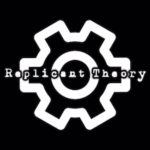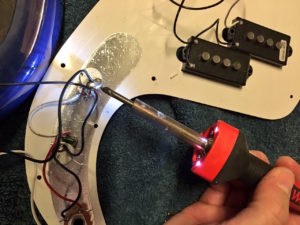 Replicant Theory is a one man progressive metal/alt-metal music project spearheaded by a multitalented man named Drew. His cinematic-sounding heavy music has been featured in video games and film.
Replicant Theory is a one man progressive metal/alt-metal music project spearheaded by a multitalented man named Drew. His cinematic-sounding heavy music has been featured in video games and film.
This week marks the release of Replicant Theory’s concept EP called Reactor Zero, a cinematic journey through a dystopian future, full of Drew’s typically tight riffs and sweeping synths that weave a fabric of compelling cinematic music that draws you in and takes you on a ride.
We connected online and his story resonated with me as it was similar to my beginnings with my own one man music project, Mojo’s Army. I jumped at the chance to interview him and discuss the inspiration for his music project and his passion for guitar mods.
Tell us about how you got started with music.
I have always had a love of music. I had my first acoustic guitar when I was about 13, but things never really took off. I bought a cheap Memphis knockoff Les Paul when I was 16 and the drive to be a “Rock Star” started to form. I started bands with people in high school and briefly played in a classic 80’s metal band when I was 18. From there I was in and out of several projects that did not catch on. My solo project, Replicant Theory, started up in the mid 2000’s and has been my predominant focus since.
What is the inspiration for the name of your project?
I was in college taking a course on Greek Mythology (great class by the way) and was inspired by the story of Prometheus, who stole fire from the gods and was tortured for eternity because of it. I did several searches on the name Prometheus Theory and discovered a poem with the same name. I figured that the name was taken because of that, and thought for a while on how to define the music I was working on. I like the word “theory” but I needed something original to go with it. Looking back, I think one of the members of the band Orgy had a brand of clothing dubbed “Replicant” and also it was a reference to Blade Runner (or “Do Robots Dream of Electric Sheep” by Philip K. Dick (a personal literary favorite)). I scoured the internet for anything called Replicant Theory and it was not in use or nothing popped up. The name was mine…
I did the same with a short list of my own project names.
What guides your creation from album to album?
Honestly, up until now I have not necessarily had a plan or a road map for the music I write. The initial Replicant Theory album was a collaboration with a very talented singer named Matt Gates. He had job opportunities out of state and I became solo at that point. The “Polaroids” album was a collection of music from the early sessions and what I had worked on since. I released it as a way to put my musical past behind me and start fresh on new ideas. The “Return EP” was my first iPhone-recorded album and was five songs that I had recorded for different games and projects. My new EP “Reactor Zero” was a focused concept album from start to finish. It was the first time I had done something like that. As I move forward I will probably have more focused releases that may have a conceptual tie-in or a stylistic one.
What in your mind is the difference between an EP length project and an LP length one?
I guess technically an album would be 8-12 songs that would be between 45 minutes to 60 minutes. An EP is 3-5 songs. (some Prog bands don’t count because 3 songs might be an hour…) For me as an artist I am transitioning to only doing EP’s. I want freedom to pursue an idea with out being tied down to spending the time to release a full album. One thing frequently talked about in podcast’s and blog’s is to always be releasing… EP’s allow me to cycle quickly and explore an idea with out getting tired of it or losing momentum.
Tell us about your recording process.
I generally will start with either a synth line, drum pattern, guitar riff or bass riff and flesh out a song from there one track at a time. I will brainstorm on one instrument based on the one or two riffs that I have initially com up with. Usually I generate 10-20 riff variations and alternate parts. From there I go through and edit down my ideas into a cohesive song. I record everything direct into iOS Garageband and then mix and master everything on my Mac in GarageBand when I consider the song to be finished. If I start to incorporate an acoustic guitar or vocals I will bring out a condenser mic, but nothing yet has required that.
What type of gear do you use, and is it different now than when you started?
Well, I record everything on an iPhone using iOS GarageBand. I use an IK Multimedia iRig PRO interface for audio and MIDI input, an IK Multimedia Blueboard for preset switching and an M-Audio expression pedal for Wah-Wah and other effects. I use apps for all guitars and soft synths. Primarily I use JamUp Pro for guitar and Redshrike, Cassini and DRC for synths. I use real guitars, basses and a 49 key M-Audio interface for synths. I do not use pre-made loops for main audio because I do not view it as making music. If I want a loop I will try to sample a real world sound and mess it up through processing to get it to where I want it.
In the early days, I used an Alesis SR16 drum machine, a Line 6 Pod and a Yahaha MD4S Mini disc recorder. I transitioned to Cakewalk, which is a piece of crap software. If people like Cakewalk, good for them, it was terrible for me. From there I discovered GarageBand and everything just worked. I have used some form of GarageBand for 12 plus years…
For physical instruments I could make a laundry list of regrets of what I have parted ways with. I tended to purge gear when I would quit (I seriously regret letting some of them go at this point in my life)… Currently I use 2 Fernandes Vertigo X’s with a serious amount of modifications, an Archer P bass with a Seymour Duncan Quarter Pound pick up, a M-Audio 49 key controller, an IK Multimedia Blueboard and an M-Audio MIDI expression pedal.
So you work primarily in Garageband? Have you ever considered switching to Logic Pro?
For DAW’s, Garageband has worked well for me. I am not a pro and really do not make money in justifying spending money for a fancier DAW. I look at it as if it’s not broke and works well, don’t change… unless it is a guitar and then all bets are off to see how much you can do to it!
Good segue to your passion for gear modifications. How did you get started with gear mods?
The first “mod” I had was a failed attempt to refinish the cheap Les Paul knockoff Memphis guitar. The next one was cutting the signal of an Ibanez Iceman X neck pick up to create a kill switch. Another cool one was fixing a beat up BC Rich Ironbird. The major mods happen a few years ago when I started to upgrade the Fernandez Vertigo’s that I currently use. The first was installing a Seymour Duncan Invader pick up… from there it was replacing all of the pots, capacitors, adding a kill switch and jacks… Ripping apart electronics and making new instruments has become a passionate hobby… At this point, every stringed instrument I own I have tinkered with or performed successful repairs on. I fully admit to being a guitar gear-head and don’t consider an instrument “mine” until I have tinkered with it somehow…
Tell us about your favorite mod project.
My favorite mods would be what I have done with my 2 Vertigo’s, Dingus and Livingston. (Yes, I named my guitars…) I gutted every electronic and installed all new guts… They went from having a crap stock pick up to a Seymour Duncan Invader with a coil split. New pots for volume and tone, capacitor, jack and kill switch… For playing distorted they are as evil as any guitar could sound… for cleans, I pull on the push / pull pot and go from a classic muddy Gibson humbucker to a bright Fender Strat in the bridge… They are exceptionally versatile single pick up guitars… I focus on playability over anything else and would not trade these for anything else… Try to find a Fernandez X single pick up model with out the built in Zoom processors and I bet you can’t… (I sometimes try to find another and I can’t).
Once I finish a few major home repair projects I will be breaking apart the Vertigo’s one at a time and refinishing them. I will be steampunking out one and turning the other into a futuristic instrument…
What are you working on now?
I am having fun playing bass in a local band called Ignition89. It is an outlet for me where I can write songs with a singer to sing them for me and I just get to go nuts playing bass guitar… I really like to rapid fire song write with the singer/guitarist.
For Replicant Theory, I am working on a handful of collaborations on older songs and an alternate reality version of “Reactor Zero EP” with a hard rocker that has a voice like Lemmy of Motorhead.
What are your long term goals for your music?
My goals really are to have an audience for the music that I create. Without listeners there is not a reason to make music. I have to have an outlet to create. I want to continue to push myself in making new music, work at getting better on my playing and explore where my ideas lead me. It would be awesome to put together a live bad and play out as Replicant Theory, but logistically it would be tough.
What is next for Replicant Theory?
My next new project is a 10 minute progressive song that may or may not be instrumental. Once that is done I will think of another topic for an EP and start writing it.
Thanks for your time!
—–
Find Replicant Theory on the web:
https://replicanttheory.com
https://replicanttheory.bandcamp.com
https://twitter.com/replicanttheory


